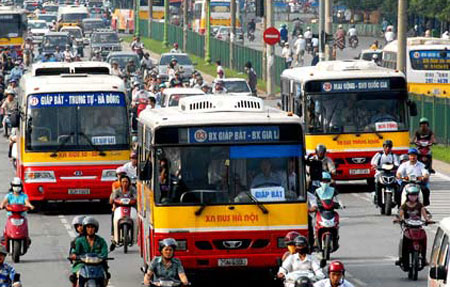Tax exemption proposals on green buses vetoed

illustration photo
According to the Ministry of Finance (MoF), to enjoy incentives regulated in MoF’s Circular 185/2012/TT-BTC, the manufacturing project for the green buses must be approved by the Ho Chi Minh City People’s Committee during the 2012-2015 period, specifying the timescale for the project’s implementation, product quantity, types, quality and the value of components for import duty exemption.
If the components can not be made locally then Ministry of Planning and Investment’s Circular 04/2012/TT-BKHDT clarifies that their import duties will be exempted.
There are a total of 28 CNG powered buses now running in Ho Chi Minh City. They are considerably cleaner than conventionally fuelled buses, helping to reduce carbon dioxide emissions by 20 per cent, nitrous oxide emissions by 75 per cent, carbon emissions by around 65 per cent and hydrocarbon emissions over 60 per cent.
In addition, fuel for the buses is cheaper by 30-40 per cent compared to conventional, petrol powered buses, according to Transport Development and Strategy Institute statistics.
The Ho Chi Minh City project to put 350 CNG buses on the roads was intended to significantly reduce the amount of harmful emissions which the city’s traffic discharges daily.
According to the project’s outline, the Saigon Transportation Mechanical Corporation (SAMCO) will manufacture 300 CNG buses from September 30, 2013 to October 2015 using imported chassis along with other components both imported and locally made.
The MoF, however, refused to offer import duty exemption to imported chassis for use with the project. It argued that was a chassis was not a component and therefore ineligible for exemption. In addition, materials, equipment and parts imported for the repair and maintenance of the environmentally friendly buses will also be subject to full import duty.
Confusion exists, as neither the importation of chassis, nor materials, equipment and parts for repairs and maintenance were mentioned in the MoF’s guiding Circular 185.
However, the MoF’s decision is likely based on the fact that several local firms are now capable of making these buses using locally produced and imported components. Due to limited demand, these companies manufacturing lines are presently underutilised.
“It would be detrimental to local firms if imported chassis for the manufacture for CNG buses were given import duty exemption,” said a local automobile manufacturing source.
The MoF also rejected the People’s Committee of Binh Duong province’s proposal to provide import duty exemption on whole form CNG bus imports intended to form part of New Binh Duong City’s public transport project.
It argued that buses larger than 30 seats could be made domestically, meaning there is no reason for import duty exemption.
Besides, the MoF added that agreeing to these import duty exemption proposals would set a precedent for others potentially harming Vietnam’s domestic manufacturing ambitions.
What the stars mean:
★ Poor ★ ★ Promising ★★★ Good ★★★★ Very good ★★★★★ Exceptional
Latest News
More News
- Foreign fruits flood Vietnamese market (December 09, 2025 | 13:22)
- Vietnam’s fruit and vegetable exports reach $7.8 billion in first 11 months (December 05, 2025 | 13:50)
- Vietnam shapes next-generation carbon market (November 26, 2025 | 15:33)
- PM urges Ho Chi Minh City to innovate and remain Vietnam’s economic locomotive (November 26, 2025 | 15:29)
- Experts chart Vietnam's digital finance path: high hopes, high stakes (November 14, 2025 | 10:56)
- Vietnam’s seafood imports surge 30 per cent in first 10 months (November 10, 2025 | 19:35)
- Vietnam’s durian exports hit $1 billion milestone (October 30, 2025 | 17:41)
- Beyond borders: Sunhouse and new era of Vietnamese brands on Amazon (October 28, 2025 | 10:46)
- Record-breaking trade fair set to open in Hanoi (October 15, 2025 | 15:59)
- Timber sector seeks solutions to VAT refunds (October 14, 2025 | 18:58)
















 Mobile Version
Mobile Version